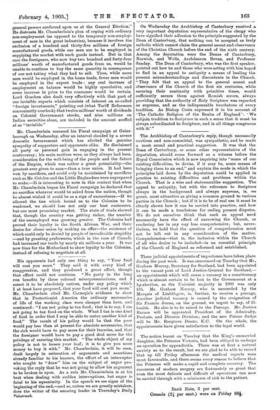The Archbishop of Canterbury's reply, though necessarily cautious and non-committal,
was sympathetic, and he made a most sound and practical suggestion. It was that the Dean of Canterbury, or some other representative of the deputation, should come forward as a witness before the Royal Commission which is now inquiring into " some of our existing difficulties, to devise, if it may be, some means of bringing them to an end," and explain the mode in which the principles laid down by the deputation could be applied in practice to existing difficulties and problems within the Church. That is a wise and statesmanlike suggestion. The appeal to antiquity, but with the reference to Scripture always in the background and always supreme, is, we grant, most attractive as giving a common ground to various parties in the Church ; but if it is to be of real use it must be clearly shown how it can be carried into practice, and bow it can be made a touchstone for ending present disputes. We do not ourselves think that such an appeal need necessarily have the effect of narrowing the Church, or rendering her in any way less comprehensive; but, never- theless, we hold that the question of comprehension must not be left out in any consideration of the matter. Comprehension—that is, the inclusion within the Church of all who desire to be included—is an essential principle of the Church of England as reformed and established.










































 Previous page
Previous page